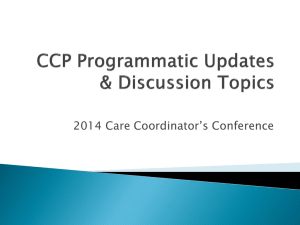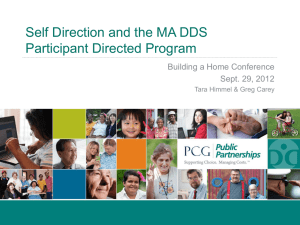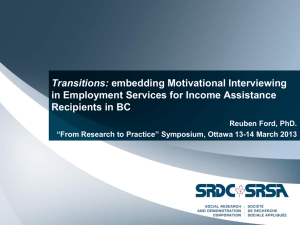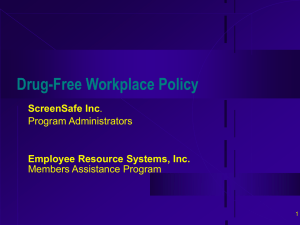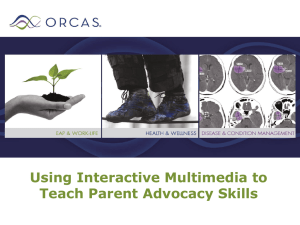CCP Programmatic Updates & Discussion Topics
advertisement
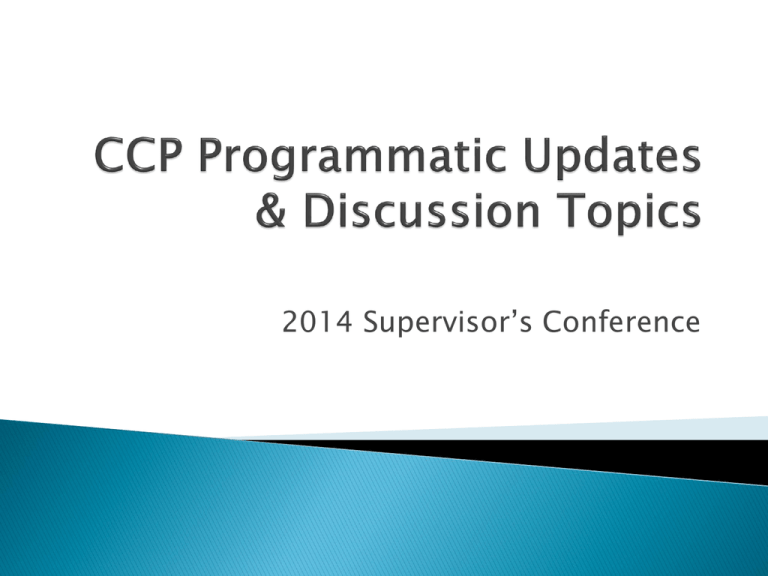
2014 Supervisor’s Conference IDOA/DHS Medicaid Application Collaboration ◦ Granting CCUs access to PACIS ◦ Establish liaisons in each FCRC ◦ Streamline application submission IDOA/DHS Medicaid Application Collaboration ◦ Move toward online submission (ABE) ◦ Cross Training ◦ Develop plan for centralization ◦ Stakeholder’s Group CCU reviews being completed to: ◦ Verify compliance with Service Authorization Guidelines (Public Act 098-0008) ◦ Verify Determination of Need (DON) scoring compliance ◦ Verify compliance with CCP timeframes ◦ Verify compliance with CCP forms Through March 2014, 6 CCU reviews have been conducted with 2 additional in April 2014 224 files have been reviewed, this number includes prescreen files Service Authorization Guidelines: 39 of 194 files not compliant, 20% Determination of Need: 35 of 194 files not compliant, 18% Timeframes: 33 of 174 files not compliant, 19% (late annual redeterminations or late Temporary Service Increase follow-up assessments with no documentation of participant delay) Completion of Forms: 35 of 174 files not compliant, 20% The CCU was provided technical assistance regarding findings, with individual participant files reviewed as needed The CCU was sent the Quality Improvement Review report with findings and corrective actions outlined Training to Care Coordinators is the primary corrective action Consider IDoA revising CCP Forms instructions to include need for frequency of tasks Continue IDoA CCU reviews Continue and enhance collaboration between IDoA & IL Council of CCU for trainings Since homecare aides are required to document tasks completed during each provision of service, CCUs are encouraged to specify frequencies in this column of the DON; without frequencies indicated the amount of service authorized may not comply with the Service Authorization Guidelines Care Coordinators should consider the number of days per week service is to be provided when specifying frequencies For example, the frequency of “five times per week” should be utilized if a participant receives service five times per week, is incontinent and requires assistance with bathing each time the homecare aide is present. A participant who attends Adult Day Service three times a week and needs assistance with taking medication at the ADS, should have the frequency “three times per week” indicated under “routine health.” “As needed” may be an appropriate task for some tasks such as telephoning A participant’s service can be flexible for which days the service is provided, however, the In-Home Service provider needs to know how many times per week service is to be provided The participant can direct the homecare aide regarding which day a task is completed For “outside home” Care Coordinators should encourage participants to utilize other transportation services besides the homecare aide Care Coordinators should authorize transport or escort for InHome Service no more than 1-2 times a week; exceptions should be documented, including attempts to find other resources Participants who are actively on Medicaid should utilize this resource for transportation to medical appointments Remember that In-Home Service agencies are not required to provide transportation via the homecare aide’s personal vehicle. Care Coordinators should refer to the In-Home Service agency’s Service Specific Application for information indicated by the agency for transportation/escort. Care Coordinators should document exceptions to Service Authorization Guidelines in case notes Service Authorization Guidelines must be utilized for all In-Home Service authorization, including Family Homecare Aides Service Authorization Guidelines do not apply to Adult Day Service Eating ◦ Seek adaptive utensils that can assist ◦ Recommend preparation of foods that do not require cutting ◦ If the participant cannot feed themselves, there has to be back up support as CCP cannot be there for all 21 meals a week ◦ HDM is not a service by other for eating Bathing ◦ Bathing, grooming, dressing A side scores should be similar ◦ Encourage use of assistive devices, such as bath seats, grab bars, etc. ◦ Daily personal care is not essential unless incontinence is an issue ◦ Do not impose your hygiene standards onto the participant Grooming ◦ Bathing, grooming, dressing A side scores should be similar ◦ Encourage use of assistive devices, such as weighted or large grip brushes—can use foam or duct tape to modify ◦ Homecare aides can only file and clean nails—no cutting of nails Dressing ◦ Bathing, grooming, dressing A side scores should be similar ◦ Encourage clothing with Velcro, elastic, etc. so participant can remain as independent as possible Transferring ◦ Consider the use of assistive devices, such as a walker, lift chair, etc. ◦ A back up support is needed as CCP cannot be there 24 hours/day—how is the participant completing this task when CCP not present? ◦ For a participant who scores 3-3 & lives alone a safe care plan may not be able to be developed ◦ Homecare aides cannot do total lifting; the participant must be able to assist with the transfer Continence ◦ Encourage use of assistive devices, such as bed side commodes, continence products, etc. ◦ A back up support is needed as CCP cannot be there 24 hours/day—how is the participant completing this task when CCP not present? ◦ Homecare aides cannot do catheter or ostomy care Managing Money ◦ Getting out to pay bills should be scored under outside home instead of managing money ◦ Utilize IL Volunteer Money Management Program (IVMMP) if available in your area ◦ In-Home Service providers must have a policy on receipt handling; receipts must be returned to participant & documented ◦ Homecare aides cannot be responsible for money management Telephoning ◦ If the participant has no phone that is not considered an impairment ◦ Encourage use of assistive devices, such as a magnifying glass, large number phone, etc. Preparing Meals ◦ Encourage meals that can be prepared ahead or extras made ◦ A participant who lives alone should not have a 3-3 score on the DON—3 on the A side of the DON means the participant cannot even warm a meal & no one is there to prepare ◦ If Home Delivered Meals in service by others is indicated, B side score should be lowered Laundry ◦ Laundry & housework A side scores should be similar ◦ A participant who can do part of the task such as folding should not be scored a 3 on the A side ◦ Consider location of laundry facilities when authorizing time to complete the task ◦ A participant with continence problems may need laundry completed more frequently Housework ◦ Housework & laundry A side scores should be similar ◦ Basic housekeeping tasks, not heavy seasonal cleaning, are to be completed by the homecare aide ◦ The homecare aide is to complete tasks for the participant, not the entire family ◦ Unless there is documentation in the CCU case notes of a medical necessity, housework should not be authorized more than 1 x a week ◦ The participant can direct the homecare aide regarding which day a task is completed Outside Home ◦ Distinction should be made between transport & escort; escort is needed when the participant is either physically or cognitively unable to leave the residence alone ◦ See slide under Service Authorization Guidelines Routine Health ◦ Homecare Aides cannot set up or administer medication; Adult Day Service can ◦ Consider how many days service provided: if participant needs reminded to take medications what happens when CCP not there? Back up support will be needed for those times Special Health ◦ Is something a licensed professional needs to perform ◦ B side should be 0 unless participant going to a facility (Choices screen) or ADS will perform; homecare aides cannot perform special health functions ◦ Watch over-scoring of this function: when scoring A side consider frequency of professional visits Being Alone ◦ For a participant who scores 3-3 & lives alone a safe care plan may not be able to be developed ◦ Can the participant recognize danger & alert others? ◦ For a participant who cannot be left alone, a back up support should be in place in case CCP service unavailable—e.g., homecare aide late, ADS closed due to weather Friendly Reminders ◦ If B side is 0, there should be no CCP services or frequency indicated ◦ If B side is lowered from A side, notation should be made in service by other column, including “self” or “manages” ◦ Side A DON score of 3 should be reserved for participant who cannot do any part of the task at all or requires constant supervision Friendly Reminders ◦ Side B DON score should be adjusted for both formal & informal supports ◦ Empower the participant to continue to do as much for themselves as possible to maintain their independence Referral is made (request for services) ◦ CCU has 5 calendar days from the referral date to respond to the referral by contacting the participant (preferably a phone call) ◦ The CCU should document the date the referral was received by the CCU, including if the referral was a fax from another agency Initial Assessment ◦ CCU has 30 calendar days to complete an Initial Assessment from the date of the request for services. ◦ If participant delay occurs, the CCU should document this in the case notes, e.g., awaiting financial verification, participant not wanting to choose provider at time of assessment Initial Assessment (continued) ◦ If a supervisor’s signature is required to approve an assessment, the supervisor must sign and date page 20 of the Comprehensive Needs Assessment. The date of the supervisor’s signature is the Eligibility Determination Date (EDD). Unless participant delay occurs, this must be within 30 calendar days from the date of request for services. The date the Care Coordinator signs the Client Agreement is the EDD; it may be different than the date the participant/authorized representative signed If eligibility not determined at the assessment, the participant can sign & date the CA but the Care Coordinator should not do so until the EDD The EDD is the date shown on section D of the Plan of Care Notification Form (POCNF) “Eligibility Finding” which is entered on the POCNF Input screen The EDD on the Client Agreement & POCNF must match Implementation of Goals of Care ◦ CCU has 15 calendar days to make referrals & implement goals of care from the date the participant signed the Goals of Care on page 20 of the CCC tool. This includes all referrals to CCP providers and to non-CCP providers. Implementation of Goals of Care ◦ The Eligibility Notification date which is entered on the POCNF Input screen is the date the CCU provides copies of the POCNF to the participant and all CCP providers. ◦ The CCU can leave the POCNF with the participant if eligibility is determined the date of the visit and all providers were notified ◦ The eligibility notification date must be within 15 calendar days of the EDD. ◦ If there was an adverse action and the CCU leaves the POCNF, the CCU can obtain a signed receipt from the participant/authorized representative rather than send the POCNF certified mail Service Start Date ◦ CCP Providers have 15 calendar days from the date of notification to begin providing services to a participant. ◦ CCP providers have 5 calendar days to return the signed Client Agreement to the CCU after the initiation of services. Both CCUs and providers should monitor assure this is completed. ◦ Service start date is the date services initially began or were increased. If service remains the same the provider should utilize the same date the Care Coordinator signed the Client Agreement. Client delay ◦ Participant has 60 calendar days from the signature on the Goals of Care to provide documentation verifying eligibility. Client Delay only pertains to CCP cases. ◦ The CCU must document participant delay in case notes ◦ Providers must also document participant delay, especially when initiating or increasing services & should report this to the CCU Review your agency’s policies at least annually to be certain all required policies are in place & up to date Review your agency’s pre-service curriculum to assure it covers all required topics & hours in CCP 240 rule Plan your agency’s in-service in advance to assure all required topics & hours in CCP 240 rule are covered for the year HCA verification of tasks—policy “CCP Participant Verification of Services—update January 2014”—effective 4/1/2014 ◦ All In-Home Service agencies required to have electronic or paper format to verify tasks performed by Homecare Aide at each provision of service ◦ If utilizing a paper form for verification of tasks do not include in/out times as is difficult to match EVV times The homecare supervisor should contact the CCU if tasks are consistently not completed in accordance with the CCU POC Deviations from CCU’s Plan of Care can be documented in same format/form as verification of tasks When requested, electronic documentation, including EVV & verification of tasks must be able to be printed by the provider Determination of Need Analysis (from October 2013 In-Home Service participant data) ◦ State-wide average DON score=48 ◦ State-wide average monthly authorized units=59 ◦ State-wide average monthly provided units=49 Determination of Need Analysis (from October 2013 In- Action Steps: Home Service participant data) ◦ CCUs should review your agency’s data with your Care Coordinators & supervisors ◦ CCUs should utilize CMIS to periodically run “Active CCP Averages” report by Care Coordinator ◦ CCUs should consider training and/or monitoring for Care Coordinators who have excessively high averages CCU Medicaid Analysis Report from October 2013 data ◦ For each CCU contract number, the report shows number & percentage of participant with 0 & less than $2,000 assets on Case Authorization Transactions (CATs) ◦ Report also shows ratio of CCP participants with Medicaid ID to those with less than $2,000 assets; greater percentage equates to increased opportunity to generate FFP (federal match) ◦ CCUs are required to document actual assets—do not assume someone has 0 assets if they are on Medicaid CCU Medicaid Analysis Report Action Steps: from October 2013 data ◦ IDoA may complete another Root Cause Analysis ◦ CCUs encouraged to utilize PACIS to obtain Medicaid status about participants ◦ CCUs encouraged to continue to communicate concerns with local FCRC to IDoA Active Caseload & Redetermination List (generated 4/10/14) ◦ For each CCU contract number, the report shows number of authorized participants, redeterminations due, & analysis of time rede is past due ◦ State-wide 31.2% of authorized participants have a rede past due per eCCPIS data ◦ State-wide average days late is 378 Active Caseload & Redetermination List Action Steps: (generated 4/10/14) ◦ CCP participants are required to have annual redetermination of need completed; Eligibility Determination Date of rede must be within 365 days of previous EDD ◦ CCUs should utilize CMIS to frequently run the “Next Assessment Report” to assure redeterminations being completed timely CCUs: please do not put other information in name & address lines in CMIS; this info is utilized for mailings & other data analysis; the notes section in CMIS can be utilized CCUS & providers: for any changes in contact information, please send email to aging.occs@illinois.gov and notify IDoA’s Office of Service Development & Procurement aging.osdp@illinois.gov CCUs: please thoroughly explain the reason a participant’s services are denied, decreased, or terminated & document the reason in the case notes CCP Providers: please inform the CCU of changes in the participant’s condition or demographics or if the participant is hospitalized; this communication should be documented in the case notes IDoA will advise CCUs & providers of the date by which FY 14 billings must be submitted, this date is usually in August Billings past that date will need to be submitted through Court of Claims CCUs: if your agency requires a supervisor review & approve the file prior to the file being processed, please factor this in to assure person(s) entering CATs has time prior to cut off date CCUs: assessments not entered into CMIS & transmitted to IDoA cannot be billed by you or your provider(s) Providers: delete any rejected payments for which you have already been paid, i.e. duplicate billing accidentally submitted MMAI Rollout CCP & MCO Differences Billing Communication Trainings Have a safe trip home Thanks for all you do
